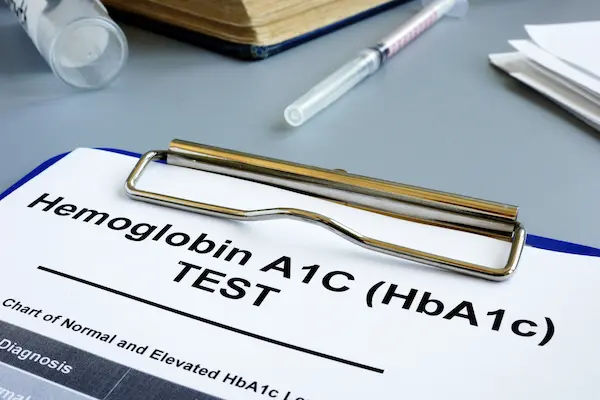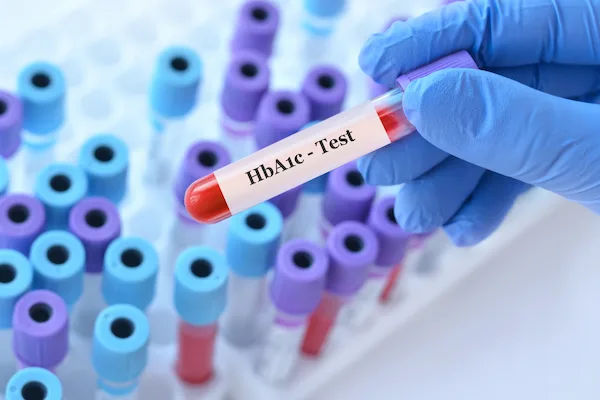HbA1c Test Overview and Results
Understand the HbA1c test, how it measures average blood sugar levels over time, and what the results indicate. Learn its role in diagnosing and managing diabetes effectively.

Written by Dr. Dhankecha Mayank Dineshbhai
Reviewed by Dr. Shaik Abdul Kalam MD (Physician)
Last updated on 13th Aug, 2025

If you or a loved one has diabetes or is at risk of developing it, you may have heard about the HbA1c test. This simple blood test is a crucial tool for managing diabetes and understanding long-term blood sugar control. In this article, we’ll break down everything you need to know about the HbA1c test: what it is, why it matters, how to interpret the results, and what you can do to keep your levels in check.
What is the HbA1c Test?
The HbA1c test, also known as the glycated hemoglobin test, measures your average blood sugar (glucose) levels over the past 2-3 months. Unlike regular blood sugar tests (like fasting or post-meal glucose tests), which give a snapshot of your sugar levels at a single moment, the HbA1c test provides a broader picture of how well your diabetes is being managed over time.
Why is it Important?
- Helps diagnose prediabetes and diabetes.
- Monitor how well your diabetes treatment plan is working.
- Reduces the risk of diabetes-related complications (like heart disease, kidney damage, or nerve problems).
Consult a Top Diabetologist
How Does the HbA1c Test Work?
When sugar circulates in your blood, it sticks to hemoglobin (a protein in red blood cells). The more sugar in your blood, the more hemoglobin gets "glycated." Since red blood cells live for about 3 months, the HbA1c test reflects your average blood sugar during that period.
How is the Test Done?
Below is the process of the test,
- A small blood sample is taken from your arm (just like a regular blood test).
- No fasting is needed, you can take it any time of the day.
- Results are usually available within a few days.
Get Your Health Assessed
Understanding Your HbA1c Results
HbA1c results are given as a percentage. Here’s what the numbers mean:
| HbA1c Level (%) | What It Means |
|----------------------|-------------------|
| Below 5.7% | Normal – No diabetes |
| 5.7% to 6.4% | Prediabetes – Higher risk of diabetes |
| 6.5% or higher | Diabetes – Needs medical attention |
If you have diabetes, your doctor will set a personalized target (usually between 6.5% and 7% for most adults). Keeping HbA1c in this range reduces complications.
What Affects HbA1c Levels?
Several factors can influence your HbA1c results:
- Diet – High sugar and refined carbs increase levels.
- Exercise – Regular physical activity helps lower blood sugar.
- Medications – Insulin or diabetes pills impact results.
- Other health conditions – Anemia or kidney disease may alter readings.
How to Improve Your HbA1c Levels
If your HbA1c is high, don’t worry small changes can make a big difference!
1. Eat a Balanced Diet
- Choose whole grains, vegetables, lean proteins, and healthy fats.
- Limit sugary drinks, sweets, and processed foods.
- Control portion sizes to avoid blood sugar spikes.
2. Stay Active
- Aim for 30 minutes of exercise (walking, cycling, yoga) most days.
- Strength training helps muscles use sugar better.
3. Monitor Blood Sugar Regularly
- Check fasting and post-meal glucose if advised by your doctor.
- Keep a log to track patterns.
4. Take Medications as Prescribed
- If you’re on diabetes medication, follow your doctor’s instructions.
- Never skip doses without consulting your healthcare provider.
5. Manage Stress & Sleep Well
- High stress raises blood sugar, try meditation or deep breathing.
- Get 7-8 hours of sleep nightly for better sugar control.
When to Get Tested?
Below are the instances where HBA1c test is performed,
- For diabetes screening: If you’re overweight, have a family history, or symptoms like frequent thirst, fatigue, or blurred vision.
- For diabetes management: Every 3-6 months if you have diabetes.
Book Your HbA1c Test with Apollo 24|7
Worried about your blood sugar levels? Apollo 24|7 makes it easy to book an HbA1c test from home or visit a nearby lab. Early detection and proper management can prevent complications and help you live a healthier life.
Final Thoughts
The HbA1c test is a powerful tool to monitor and manage diabetes. By understanding your results and making healthy lifestyle changes, you can keep your blood sugar in check and reduce health risks. If you have concerns, always consult your doctor for personalized advice.
Consult a Top Diabetologist
Consult a Top Diabetologist

Dr. Lakshmi Sanjitha Kakani
General Physician/ Internal Medicine Specialist
6 Years • MBBS, MD (General Medicine)
Visakhapatnam
Apollo 24|7 Clinic - Andhra Pradesh, Visakhapatnam

Dr. Suraja Nutulapati
General Physician/ Internal Medicine Specialist
10 Years • MBBS, MD (Internal Medicine)
Hyderabad
Apollo 24|7 Clinic, Hyderabad
(975+ Patients)

Dr. Arif Ahmed
General Physician/ Internal Medicine Specialist
9 Years • MBBS, MD (Genl. Med.)
Kolkata
MCR SUPER SPECIALITY POLY CLINIC & PATHOLOGY, Kolkata

Dr. Nilotpal Mitra
General Physician/ Internal Medicine Specialist
21 Years • MBBS, PGDGM ( Geriatric Medicine), ACMDC (an Advance course in Diabetes and cardiovascular diseases from PHFI and WHF )
Kolkata
MCR SUPER SPECIALITY POLY CLINIC & PATHOLOGY, Kolkata
(25+ Patients)

Dr. Arabinda Bera
General Physician/ Internal Medicine Specialist
20 Years • MBBS, PGDCC(CARDIOLOGY), CCEEDM(DIABETES)
Kolkata
MCR SUPER SPECIALITY POLY CLINIC & PATHOLOGY, Kolkata
Consult a Top Diabetologist

Dr. Lakshmi Sanjitha Kakani
General Physician/ Internal Medicine Specialist
6 Years • MBBS, MD (General Medicine)
Visakhapatnam
Apollo 24|7 Clinic - Andhra Pradesh, Visakhapatnam

Dr. Suraja Nutulapati
General Physician/ Internal Medicine Specialist
10 Years • MBBS, MD (Internal Medicine)
Hyderabad
Apollo 24|7 Clinic, Hyderabad
(975+ Patients)

Dr. Arif Ahmed
General Physician/ Internal Medicine Specialist
9 Years • MBBS, MD (Genl. Med.)
Kolkata
MCR SUPER SPECIALITY POLY CLINIC & PATHOLOGY, Kolkata

Dr. Nilotpal Mitra
General Physician/ Internal Medicine Specialist
21 Years • MBBS, PGDGM ( Geriatric Medicine), ACMDC (an Advance course in Diabetes and cardiovascular diseases from PHFI and WHF )
Kolkata
MCR SUPER SPECIALITY POLY CLINIC & PATHOLOGY, Kolkata
(25+ Patients)

Dr. Arabinda Bera
General Physician/ Internal Medicine Specialist
20 Years • MBBS, PGDCC(CARDIOLOGY), CCEEDM(DIABETES)
Kolkata
MCR SUPER SPECIALITY POLY CLINIC & PATHOLOGY, Kolkata





